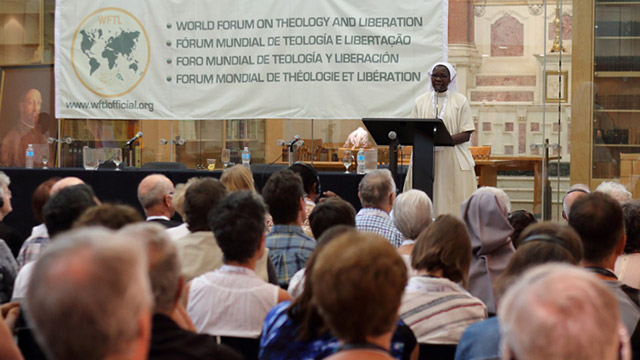Religious Reflections at the World Social Forum

International
(Présence-info) "Religion and the religious are elements that are important, even essential, to building another possible world." This is one of the convictions that Dominique Boisvert, writer and activist involved in several social causes, expressed last week at the World Social Forum (WSF) in Montreal.
This alterglobalist gathering, instituted in Porto Alegre, Brazil, in 2001, was being held for the first time in a the Global North. While the World Economic Forum in Davos is a gathering of world leaders and financiers, its grass-roots counterpart, the World Social Forum, brings together thousands of people and hundreds of organizations. It is defined as an "open meeting space promoting deeper reflection, the democratic debate of ideas, and the creation of proposals."
Last Wednesday, at the Cégep du Vieux Montréal, Dominique Boisvert led a workshop on the place of religion in the movements that wish to "build another possible world."
He acknowledged that for many in North America, "religion is essentially a relic of a bygone era." It is politely tolerated "as long as it does not occupy any place or play any role in the public or common space."
However, he then pointed out to the dozen of people who attended his workshop that "the values that underlie this new world that we wish to build have all, since long ago, been promoted by one religion or another." Cofounder of the Réseau québécois pour la simplicité volontaire, Dominique Boisvert spoke of values, including concern for the common good and the dignity of human beings.
"Not many alterglobalists could object to the golden rule upheld by most religions, which is, "Do unto others as you would have them do unto you," any more than they could object "to altruism, charity, dedication, or concern for others."
According to the author of the recent books Québec, tu négliges un trésor! and La pauvreté vous rendra libres! (at Novalis), it would be "absolutely ridiculous and reckless to deprive oneself of all this wealth bequeathed by history simply because it has to do with religion."
Theological Forum
Since 2005, during every World Social Forum, a World Forum on Theology and Liberation is held. The event brings together theologians and activists from different organizations "who discuss theology, Christian analysis, and liberation."
This meeting, the 7th since 2005, was held in Montreal on August 8 at Collège Jean-de-Brébeuf, on the eve of the opening of the WSF, and continued on Saturday, August 13. Between these two days, those who registered for it participated in the conferences and even lead self-managed workshops at the WSF.
Such is the case with the Catholic organization Development and Peace, which offered workshops on agroecology and on Pope Francis' encyclical Laudato si'. Also, Secours Catholique from France organized a workshop concerning migrants' rights. Members of Pax Christi are discussing the principles of non-violence. Finally, ACAT Canada (Action of Christians against Torture) ran a workshop entitled Vérité et justice dans les coulisses du théâtre de la guerre (Truth and justice in the wings of the theatre of war), as Brian McDonough, director of the Social Action Office of the Archdiocese led a "participative theater" about food security and the supportive presence of the Church.
"After Porto Alegre, Nairobi, Belem, Dakar, and twice in Tunis, we find ourselves in Montreal," stated theologian Denise Couture to some 300 people that attended on Monday at the opening of the World Forum on Theology and Liberation. "Your participation is testimony to the vitality and dynamism of grass-roots Christian groups, involved in countless struggles against all forms of oppression and for the liberation of all persons."
"You did not come to attend a symposium or conference like any other," added the professor from Université de Montréal's Faculty of Theology and Religious Sciences.
"It consists in experiencing together a process of transformation in progress to create another possible world. Civil society, and we, the grass-roots Christian communities represented at the World Forum on Theology and Liberation, gather in an open meeting space to organize, experience, and celebrate the struggles against the structures of domination and for the change to occur now."

Comment
0 Comment
Add new comment